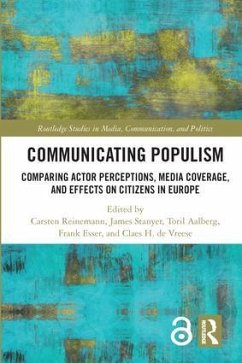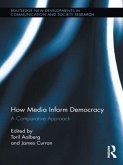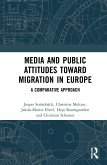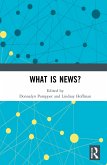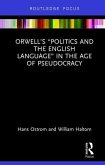Communicating Populism
Comparing Actor Perceptions, Media Coverage, and Effects on Citizens in Europe
Herausgeber: Reinemann, Carsten; Aalberg, Toril; Stanyer, James
Communicating Populism
Comparing Actor Perceptions, Media Coverage, and Effects on Citizens in Europe
Herausgeber: Reinemann, Carsten; Aalberg, Toril; Stanyer, James
- Gebundenes Buch
- Merkliste
- Auf die Merkliste
- Bewerten Bewerten
- Teilen
- Produkt teilen
- Produkterinnerung
- Produkterinnerung
This book presents findings from several large-scale internationally comparative empirical studies. It includes a summary of findings with advice for stakeholders like politicians, the media, and citizens about how to deal with the challenge of populist political communication.
Andere Kunden interessierten sich auch für
![How Media Inform Democracy How Media Inform Democracy]() How Media Inform Democracy212,99 €
How Media Inform Democracy212,99 €![Rhetoric, Fantasy, and the War on Terror Rhetoric, Fantasy, and the War on Terror]() Vaheed RamazaniRhetoric, Fantasy, and the War on Terror180,99 €
Vaheed RamazaniRhetoric, Fantasy, and the War on Terror180,99 €![Media and Public Attitudes Toward Migration in Europe Media and Public Attitudes Toward Migration in Europe]() Media and Public Attitudes Toward Migration in Europe191,99 €
Media and Public Attitudes Toward Migration in Europe191,99 €![Let's Agree to Disagree Let's Agree to Disagree]() Nolan HigdonLet's Agree to Disagree191,99 €
Nolan HigdonLet's Agree to Disagree191,99 €![What IS News? What IS News?]() What IS News?191,99 €
What IS News?191,99 €![Mapping Foreign Correspondence in Europe Mapping Foreign Correspondence in Europe]() Mapping Foreign Correspondence in Europe180,99 €
Mapping Foreign Correspondence in Europe180,99 €![Orwell's "e;Politics and the English Language"e; in the Age of Pseudocracy Orwell's "e;Politics and the English Language"e; in the Age of Pseudocracy]() Hans OstromOrwell's "e;Politics and the English Language"e; in the Age of Pseudocracy80,99 €
Hans OstromOrwell's "e;Politics and the English Language"e; in the Age of Pseudocracy80,99 €-
-
-
This book presents findings from several large-scale internationally comparative empirical studies. It includes a summary of findings with advice for stakeholders like politicians, the media, and citizens about how to deal with the challenge of populist political communication.
Produktdetails
- Produktdetails
- Verlag: Taylor & Francis
- Seitenzahl: 280
- Erscheinungstermin: 18. März 2019
- Englisch
- Abmessung: 231mm x 157mm x 23mm
- Gewicht: 522g
- ISBN-13: 9781138392724
- ISBN-10: 1138392723
- Artikelnr.: 56131457
- Verlag: Taylor & Francis
- Seitenzahl: 280
- Erscheinungstermin: 18. März 2019
- Englisch
- Abmessung: 231mm x 157mm x 23mm
- Gewicht: 522g
- ISBN-13: 9781138392724
- ISBN-10: 1138392723
- Artikelnr.: 56131457
Carsten Reinemann is a professor of political communication and head of the Department of Media and Communication at Ludwig-Maximilians-University Munich, Germany. His research interests include populism, extremism, political journalism, and media effects. James Stanyer is a professor of communication and media analysis, School of Social Sciences, Loughborough University, UK. His work has appeared in a wide range of academic journals, and he is the author of Intimate Politics (2013), Modern Political Communication (2007), and The Creation of Political News (2001). Toril Aalberg is a professor and head of the department of sociology and political science at NTNU in Trondheim, Norway. Her research interests include comparative politics, election campaigns, how media affects public opinion, the relationship between media and politics, and the role of stereotypes. Frank Esser is a professor of international and comparative media research at the University of Zurich. His research focuses on cross-national studies of news journalism and political communication. Claes H. de Vreese is a professor and chair of political communication at the Amsterdam School of Communication Research (ASCoR), University of Amsterdam. His research focuses on political journalism, populism, news media effects, and public opinion.
Chapter 1: Introduction: Comprehending and investigating populist
communication from a comparative perspective PART IPopulism and
Communicators Chapter 2: Perceptions of Populism and the Media: A
Qualitative Comparative Approach to Studying the Views of Journalists and
Politicians Chapter 3: Journalists' Perceptions of Populism and the Media:
A Cross-National Study Based on Semi-Structured Interviews Chapter 4:
Politicians' Perceptions of Populism and the Media: A Cross-National Study
Based on Semi-Structured Interviews PART II
Populism in the Media Chapter 5: Dimensions, Speakers, and Targets: Basic
Patterns in European Media Reporting on Populism Chapter 6: Journalistic
Culture, Editorial Mission, and News Logic: Explaining the Factors Behind
the Use of Populism in European Media Chapter 7: Event-, Politics-, and
Audience-Driven News: A Two-Year Comparison of Populism in European Media
Coverage PART III
Populism and Citizens Chapter 8: The Persuasiveness of Populist
Communication: Conceptualizing the Effects and Political Consequences of
Populist Communication from a Social Identity Perspective Chapter 9:
Investigating the Effects of Populist Communication. Design and Measurement
of the Comparative Experimental Study Chapter 10: Cognitive Responses to
Populist Communication: The Impact of Populist
Message Elements on Blame Attribution and Stereotyping Chapter 11:
Attitudinal and Behavioral Responses to Populist Communication: The Impact
of Populist Message Elements on Populist Attitudes and Voting Intentions
PART IV Conclusion Chapter 12: Adapting to the Different Shades of
Populism. Key Findings and Implications for Media, Citizens, and Politics
communication from a comparative perspective PART IPopulism and
Communicators Chapter 2: Perceptions of Populism and the Media: A
Qualitative Comparative Approach to Studying the Views of Journalists and
Politicians Chapter 3: Journalists' Perceptions of Populism and the Media:
A Cross-National Study Based on Semi-Structured Interviews Chapter 4:
Politicians' Perceptions of Populism and the Media: A Cross-National Study
Based on Semi-Structured Interviews PART II
Populism in the Media Chapter 5: Dimensions, Speakers, and Targets: Basic
Patterns in European Media Reporting on Populism Chapter 6: Journalistic
Culture, Editorial Mission, and News Logic: Explaining the Factors Behind
the Use of Populism in European Media Chapter 7: Event-, Politics-, and
Audience-Driven News: A Two-Year Comparison of Populism in European Media
Coverage PART III
Populism and Citizens Chapter 8: The Persuasiveness of Populist
Communication: Conceptualizing the Effects and Political Consequences of
Populist Communication from a Social Identity Perspective Chapter 9:
Investigating the Effects of Populist Communication. Design and Measurement
of the Comparative Experimental Study Chapter 10: Cognitive Responses to
Populist Communication: The Impact of Populist
Message Elements on Blame Attribution and Stereotyping Chapter 11:
Attitudinal and Behavioral Responses to Populist Communication: The Impact
of Populist Message Elements on Populist Attitudes and Voting Intentions
PART IV Conclusion Chapter 12: Adapting to the Different Shades of
Populism. Key Findings and Implications for Media, Citizens, and Politics
Chapter 1: Introduction: Comprehending and investigating populist
communication from a comparative perspective PART IPopulism and
Communicators Chapter 2: Perceptions of Populism and the Media: A
Qualitative Comparative Approach to Studying the Views of Journalists and
Politicians Chapter 3: Journalists' Perceptions of Populism and the Media:
A Cross-National Study Based on Semi-Structured Interviews Chapter 4:
Politicians' Perceptions of Populism and the Media: A Cross-National Study
Based on Semi-Structured Interviews PART II
Populism in the Media Chapter 5: Dimensions, Speakers, and Targets: Basic
Patterns in European Media Reporting on Populism Chapter 6: Journalistic
Culture, Editorial Mission, and News Logic: Explaining the Factors Behind
the Use of Populism in European Media Chapter 7: Event-, Politics-, and
Audience-Driven News: A Two-Year Comparison of Populism in European Media
Coverage PART III
Populism and Citizens Chapter 8: The Persuasiveness of Populist
Communication: Conceptualizing the Effects and Political Consequences of
Populist Communication from a Social Identity Perspective Chapter 9:
Investigating the Effects of Populist Communication. Design and Measurement
of the Comparative Experimental Study Chapter 10: Cognitive Responses to
Populist Communication: The Impact of Populist
Message Elements on Blame Attribution and Stereotyping Chapter 11:
Attitudinal and Behavioral Responses to Populist Communication: The Impact
of Populist Message Elements on Populist Attitudes and Voting Intentions
PART IV Conclusion Chapter 12: Adapting to the Different Shades of
Populism. Key Findings and Implications for Media, Citizens, and Politics
communication from a comparative perspective PART IPopulism and
Communicators Chapter 2: Perceptions of Populism and the Media: A
Qualitative Comparative Approach to Studying the Views of Journalists and
Politicians Chapter 3: Journalists' Perceptions of Populism and the Media:
A Cross-National Study Based on Semi-Structured Interviews Chapter 4:
Politicians' Perceptions of Populism and the Media: A Cross-National Study
Based on Semi-Structured Interviews PART II
Populism in the Media Chapter 5: Dimensions, Speakers, and Targets: Basic
Patterns in European Media Reporting on Populism Chapter 6: Journalistic
Culture, Editorial Mission, and News Logic: Explaining the Factors Behind
the Use of Populism in European Media Chapter 7: Event-, Politics-, and
Audience-Driven News: A Two-Year Comparison of Populism in European Media
Coverage PART III
Populism and Citizens Chapter 8: The Persuasiveness of Populist
Communication: Conceptualizing the Effects and Political Consequences of
Populist Communication from a Social Identity Perspective Chapter 9:
Investigating the Effects of Populist Communication. Design and Measurement
of the Comparative Experimental Study Chapter 10: Cognitive Responses to
Populist Communication: The Impact of Populist
Message Elements on Blame Attribution and Stereotyping Chapter 11:
Attitudinal and Behavioral Responses to Populist Communication: The Impact
of Populist Message Elements on Populist Attitudes and Voting Intentions
PART IV Conclusion Chapter 12: Adapting to the Different Shades of
Populism. Key Findings and Implications for Media, Citizens, and Politics

